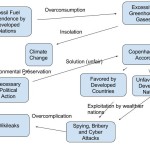My diagram discusses the problem of climate change, the solution of the Copenhagen Accord and the justification of WikiLeaks. Climate change is a global issue while a few nations are far more responsible than the rest of the world. These nations are typically post-industrialized; however, underdeveloped nations deal with the same backlash of climate change because it is global in scale. The Copenhagen Accord was a proposal aimed at remediating climate change. Some countries were in favor, but climate change is just as much an economic problem as it is an environmental one. The agreement would impose different effects on certain nations, as each nation has a differing economy. This particular agreement would work well for the United States, while being opposed by nations like Brazil and Bolivia. Through wiretaps, bribery and computer hacking, the United States was able to get enough developing nations on board with the Copenhagen Accord. As a result, the Accord was adopted by the United Nations. To sum things up, the United States used its economic and political power to corruptly influence a global decision. Had this been about oil or weapons, Fox News would still be airing the story to this day. My diagram aims to communicate the message that the United States wrongfully influenced nations. For example, Haiti will feel the repercussions of climate change, despite releasing far fewer emissions than post-industrialized nations. Once again, money and political power have come before the environment.
The cables deserved to be leaked, plain and simple. As previously stated, climate change is a global issue created by a handful of nations. Poorer nations are less equipped to deal with the end results of the climate change. For example, precipitation changes may lead to desertification, resulting in poor agricultural conditions. The United States is attempting to stay in the driver’s seat and run the world. I would be completely fine with that position if this was an issue of terrorism but it is not. Nations in Europe sustain a high quality of life without such a disastrous environmental impact. Economies are very complex, but in my modest opinion, the United States could survive with a change in economic structure focusing on more sustainable practices. While the Copenhagen Accord was not a terribly binding agreement, the economies of smaller, less powerful countries have far less room for change. I hope the United States is considering the global effects of its decisions. As a whole, the Copenhagen Accord seems like one big failure. Countries do not agree on its success and it does not guarantee much. A document that clearly states what needs to be accomplished by when and who would be a much better solution. Developing nations should ideally have just as much of a say as post-industrialized and industrialized nations, as climate change is global in scale. As an environmental geography student. I hope my own country can get its act together on climate change. I’ll end with the question, “If Al Gore were elected, where would we be?”


Hey, my name is Katelyn. The link to my blog is http://sites.psu.edu/geog30/2016/04/09/climate-change-12/
I agree that the cables deserved to be leaked. I think the United States could have got about this situation in a different way. They should have communicated withe the other countries instead of threatening them or bribing them. Really enjoyed your post!